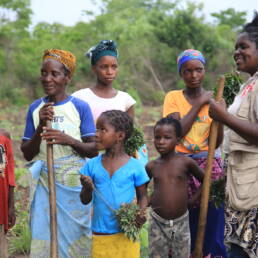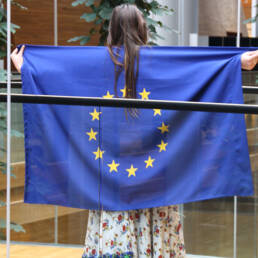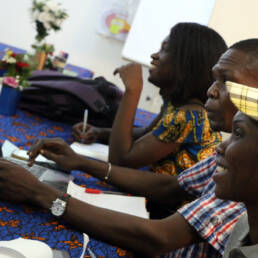On International Migrants Day, Caritas Europa calls on the new European Commission to promote policies that enhance, foster and facilitate the potential of migration to contribute to sustainable development worldwide. This entails encouraging EU Member States to expand safe and legal migration channels to Europe and ensuring European policies do not undermine regional mobility in other parts of the world.
In the current political climate, we urge European policymakers to be bold and to prioritise fair migration policies. Migration is an opportunity for our societies to build a more prosperous, global “Common Home”, where everyone can make a meaningful contribution and live in dignity.”
Maria Nyman, Caritas Europa Secretary General.
The Caritas network recently launched a series of publications on the strong links between migration and development, entitled “Common Home”. All 11 national publications and the final European one, show that migrants and migration can make important contributions to sustainable development. Here is but one example from Belgium indicating how migrants can improve access to healthcare in their countries of origin:
Solidarco is an association created by the Congolese diaspora and the Belgian Mutual Fund Solidaris that offers Congolese migrants residing in Belgium the opportunity to purchase health insurance for their relatives in Kinshasa. While payments are made to a European-based insurance company, health services can only be enjoyed by non-migrants in the country of origin. This scheme … aims at providing a solution to non-migrant family members who have no or limited access to healthcare in their country. Most importantly, it aims at reducing financial hardship on the immigrant themselves, as they often have to contribute to the health expenses of their relatives in the country of origin.
Jean-Michel Lafleur and Abdelsalam Marfouk, Belgian Common Home Publication
From job-creation to social security, from art to politics, from remittances to international cooperation, findings by Caritas Europa’s Common Home series show the potential of migration as a lever for development both in Europe and beyond. Research has also consistently shown that most migration is not across continents, but within regions and countries. For example, in West Africa, over 70% of emigrants stay in the region (UNCTAD). In drought-stricken Sahel, seasonal and temporary migration are a key survival strategy for many, including for vulnerable households and communities.
Yet, particularly in Europe, migration is increasingly seen as a threat rather than an opportunity. In their relations with African countries, the EU and its Member States have increasingly prioritised migration control and the fight against irregular migration, closing the door to regular migration channels. As most recently argued by the UN Special Rapporteur on the human rights of migrants, European pressure on West African governments to control Europe-bound migration has contributed to undermining regional freedom of movement and led to the criminalisation of mobility altogether. Such mobility is a key factor of social and economic development for local communities in West Africa.
On the one hand, European policy-makers need to prioritise fair migration policies that include the expansion of safe and regular channels to Europe, such as pilot projects on labour migration that draw on the Global Skills Partnership model. On the other, EU policy-makers need to ensure that their migration policies do not harm regional mobility elsewhere, undermining development in the Global South.”
Dr. Shannon Pfohman, Caritas Europa Policy and Advocacy Director
Notes to the editor:
- On November 5, Caritas Europa launched Common Home: Migration and Development in Europe and Beyond. In this European-wide publication, which marks the end of the Common Home series in the realm of the MIND project, Caritas explores the complex interconnections between migration and development through the lens of its faith-based ethical framework (click here for a short introductory video). This publication, drawing on empirical data, existing research and the experiences on the ground of the Caritas Europa network, showcases the vital contribution of migrants to the development and well-being of our societies. Common Home also provides a comprehensive analysis of current European policy on migration and development, touching upon issues such as migrant integration in Europe, the externalisation of European migration policy, the new ‘root causes of migration’ approach in European development cooperation, and much more. Finally, the publication provides 27 concrete recommendations to European policy-makers to ensure that their policies contribute to integral human development, leaving no one behind. For more information: full publication as well as the executive summary; launch event of Common Home at the EP; 11 national Common Home Publications.
- Labour migration channels to Europe remain primarily a competence of EU Member States. However, EU institutions have recently taken up a coordinating role in supporting and coordinating a number of pilot initiatives on labour migration between selected European and African countries, mostly from North Africa. Amongst promising projects is PALIM, an initiative linking Morocco’s growing ICT sector with Belgium’s qualified ICT workers shortages, which draws on the Global Skills Partnership (GSP) GSP aim to ensure that the benefits of migration are shared equally among countries of origin, destination and the migrants themselves. Under the terms of these partnerships, countries of destination contribute to providing technologies, know-how and other resources to countries with the aim of building capacities and skills of both migrants and people who decide to stay in countries of origin.
- Just as in Europe, regional mobility is an important factor of social and economic development for local communities in other parts of the world. For example, several West African countries are part of the Economic Community of West African States (ECOWAS), which guarantees a number of mobility rights to citizens of member countries (including the right of entry, right of residence and right of establishment, pending fulfilment of certain conditions). In 2018, a mission to Niger conducted by Felipe González Morales (UN Special Rapporteur on the human rights of migrants) found that the Nigerien law against migrant smuggling (Law No. 2015-36), supported by the European Union, “has resulted in a de facto ban of all travel north of Agadez, e.g. in violation of the freedom of movement of ECOWAS nationals.” Moreover, he also added that “the lack of clarity of the law and its implementation as a repressive measure – instead of protection – has resulted in the criminalisation of all migration upwards.” Read the statement here.
More information




